When it comes to construction projects that require a significant volume of concrete, the use of a concrete pump truck is often essential for efficiency and convenience. The cost of renting a concrete pump truck is typically charged by the hour, and understanding this cost is crucial for budgeting and project planning. The hourly rate can vary widely depending on the pump truck’s size, the type of pump, and the region in which you’re working. I’ve found that factors such as the project’s complexity and the duration of the rental also play pivotal roles in determining the final cost.
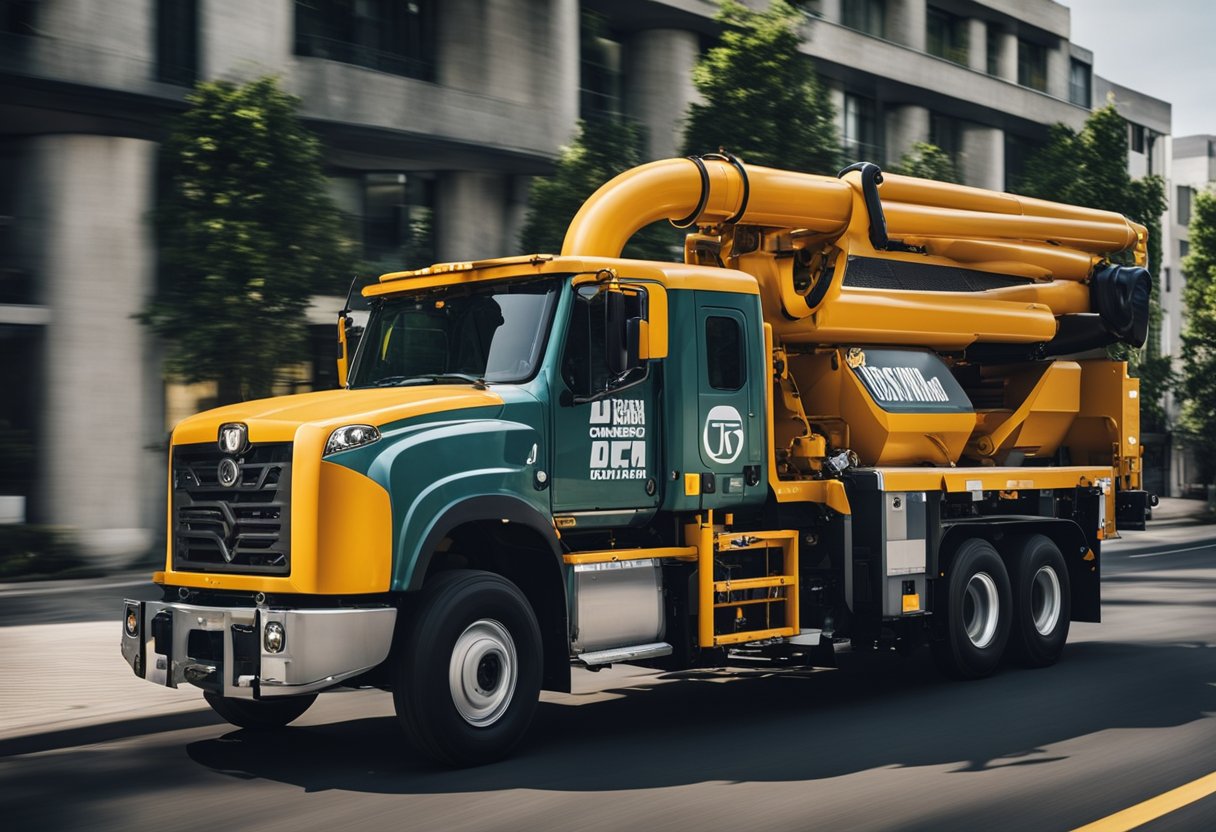
My experience in the concrete industry has taught me that evaluating the cost of a concrete pump truck per hour involves more than just the rental fee. Operational and labor costs, maintenance, and additional equipment that may be required to support the pump truck must be taken into account. The specifics of the project, such as the distance to the job site and the concrete’s ease of access, also influence the hourly cost. It’s imperative to consider all these elements when budgeting for the use of a concrete pump truck.
Contents
Key Takeaways
- The cost of a concrete pump truck per hour is influenced by the type, size, and region.
- Assessing labor, operation, and project-specific considerations is essential in cost calculation.
- A comprehensive examination of associated costs ensures accurate budgeting for concrete projects.
Understanding Concrete Pump Truck Costs
https://www.youtube.com/watch?v=Ix9F5nBtADk&embed=true
When researching the rental or purchase cost of a concrete pump truck, it’s essential to consider a range of factors that can significantly affect pricing. From the specifics of the truck itself to the circumstances under which it will be used, understanding these nuances can guide my decisions and ensure cost-efficiency.
Factors Influencing Concrete Pump Truck Cost
Location and Duration:
- Location: The distance from the rental company and the job site influences transportation costs.
- Duration: A longer rental period can affect the hourly rate, possibly leading to discounted rates for extended usage.
Operation and Labor:
- Skilled Operator: The cost usually includes a skilled operator, which is crucial because the operation complexity demands expertise.
- Labor Rates: Labor market conditions in the area can also sway the overall cost.
Demand and Type of Job:
- Demand: High demand for concrete pumps in a region can inflate rental costs.
- Job Type: Specialized jobs requiring unique concrete pumps can increase the price due to specific equipment demands.
Concrete Pump Truck Specifications
- Size and Reach: The size and reach of the pump truck, from a compact 20-meter boom to an extensive 60-meter reach, impact the cost.
- Model: Newer models with advanced features also command a higher rate compared to older units.
- Condition and Power:
- Year and Condition: The year of manufacturing and the current condition of the concrete pump truck affect the rental or purchase price. A newer model in pristine shape will be priced higher.
- Power: A pump truck with a higher horsepower engine that can handle larger volumes of concrete pumping will be more expensive.
By reviewing these factors and specifications, I can make an informed decision about the pricing of concrete pump trucks, ensuring that the chosen model aligns with my project requirements and budget.
Cost Breakdown of Concrete Pump Truck Rental
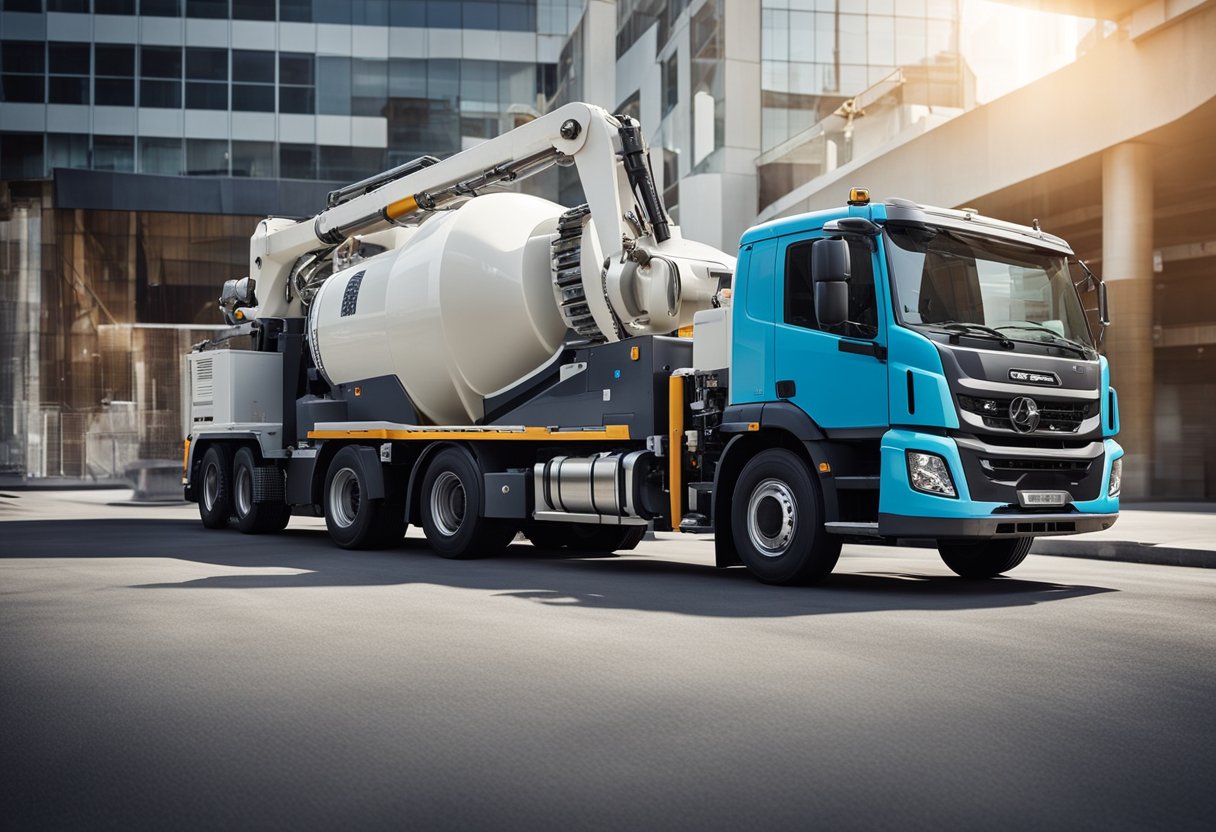
When I’m looking to rent a concrete pump truck, understanding the various costs involved is crucial. These include not just the base rental rate, but also additional fees and travel costs.
Rental Costs
Rental fees vary based on the size and capacity of the concrete pump truck. On average, I’ve found the cost to rent a concrete pump truck may range from $200 to $500 per hour. This could change depending on the region and the complexity of the operation.
Additional Charges
Beyond the hourly rate, I must account for additional charges that might affect the overall cost. This often includes the operator’s fee, which can be essential for operating the pump. Furthermore, some companies may charge for the initial setup and cleanup, typically amounting to a fixed price that can be up to a couple of hundred dollars.
Travel Costs
Lastly, travel expenses come into play when the concrete pump truck must be transported to and from the job site. These travel costs add up based on the distance the pump truck needs to travel. If the site is far from the rental company’s location, I can expect the travel cost to significantly impact the total cost of renting a concrete pump truck. This is often calculated as a per-mile charge or as a flat rate if it’s within a certain radius from the rental yard.
Comparison of Different Types of Concrete Pumps
https://www.youtube.com/watch?v=qp5sFv0rsSM&embed=true
In comparing the costs of concrete pumps, it is imperative to focus on the two primary categories: trailer-mounted concrete pumps and boom pumps, each with its respective operational capabilities and cost implications.
Trailer-Mounted Concrete Pumps
Trailer-mounted concrete pumps, due to their size and mobility, are cost-effective for smaller projects with less demanding concrete placement tasks. The cost for renting these pumps typically ranges, but it is essential to consider additional costs such as operational fees and maintenance. For example, a trailer-mounted concrete pump might be an ideal choice if cost and maneuverability are significant factors in a project. These pumps are often more affordable than larger boom pumps, both in rental price and operational cost.
Boom Pumps and Line Pumps
Boom pumps, characterized by their extendable arms, are preferred for large-scale construction projects due to their high reach and efficient concrete placement. Conversely, the cost associated with boom pumps is substantially higher, reflecting their advanced capabilities and the complexity of operation. Line pumps, a variant often included within the broader category of boom pumps, provide a balance between the portability of trailer-mounted pumps and the power of the larger boom pumps. When I consider operational speed and cost efficiency for substantial projects, the large-scale boom pumps generally offer a better return on investment despite their higher hourly rates.
In summary, selecting the appropriate concrete pump type hinges not just on the hourly rate but also on the project scale and specific requirements. While trailer-mounted pumps are a budget-friendly option for less complex jobs, boom pumps deliver value through their efficiency on larger construction sites.
Calculating Concrete Requirements
https://www.youtube.com/watch?v=G_q8zehRInU&embed=true
Before we dive into the nitty-gritty of concrete requirements, it’s pivotal to understand that estimating the volume of concrete mix needed is the cornerstone of cost management in concrete construction.
Estimating Concrete Mix Volume
To determine how much concrete is required for a project, I begin by calculating the volume of the space to be filled. This is typically measured in cubic yards. For a slab, for example, I’d multiply the length by the width by the depth of the space. I ensure to convert all dimensions to feet before my calculation since the volume of concrete is often quoted in cubic yards.
Steps to estimate concrete mix volume:
- Measure the space: Accurately measure the length, width, and depth in feet.
- Convert to cubic feet: Multiply these three figures together to find the volume in cubic feet.
- Convert to cubic yards: Since one cubic yard is equal to 27 cubic feet, I divide my total cubic feet by 27 to get the concrete mix volume in cubic yards.
For smaller projects, where a wheelbarrow and shovel are used for site mixing, knowing the mix ratio is essential. A typical mix might be 1 part cement to 2 parts sand to 3 parts gravel by volume. However, to order pre-mixed concrete from a concrete mixing truck, I focus solely on the cubic yardage of the area to be filled.
It’s also significant to account for overage; I typically add about 10% extra to my estimate to ensure that I have enough concrete mix. This compensates for spillage, over-excavation, or slight miscalculations in depth.
For projects requiring a truckload of ready-mix concrete, the concrete prices are usually set per cubic yard delivered. If the delivery includes a concrete pump truck, the cost may be quoted on a per-hour basis, which is vital to consider when planning my overall budget.
Knowing the project’s specific needs, whether it utilizes manual mixing with wheelbarrows and shovels or a delivery from a concrete mixing truck, helps me determine not only the volume but the logistics and cost-efficiency of the concrete I require.
Labor and Operational Costs
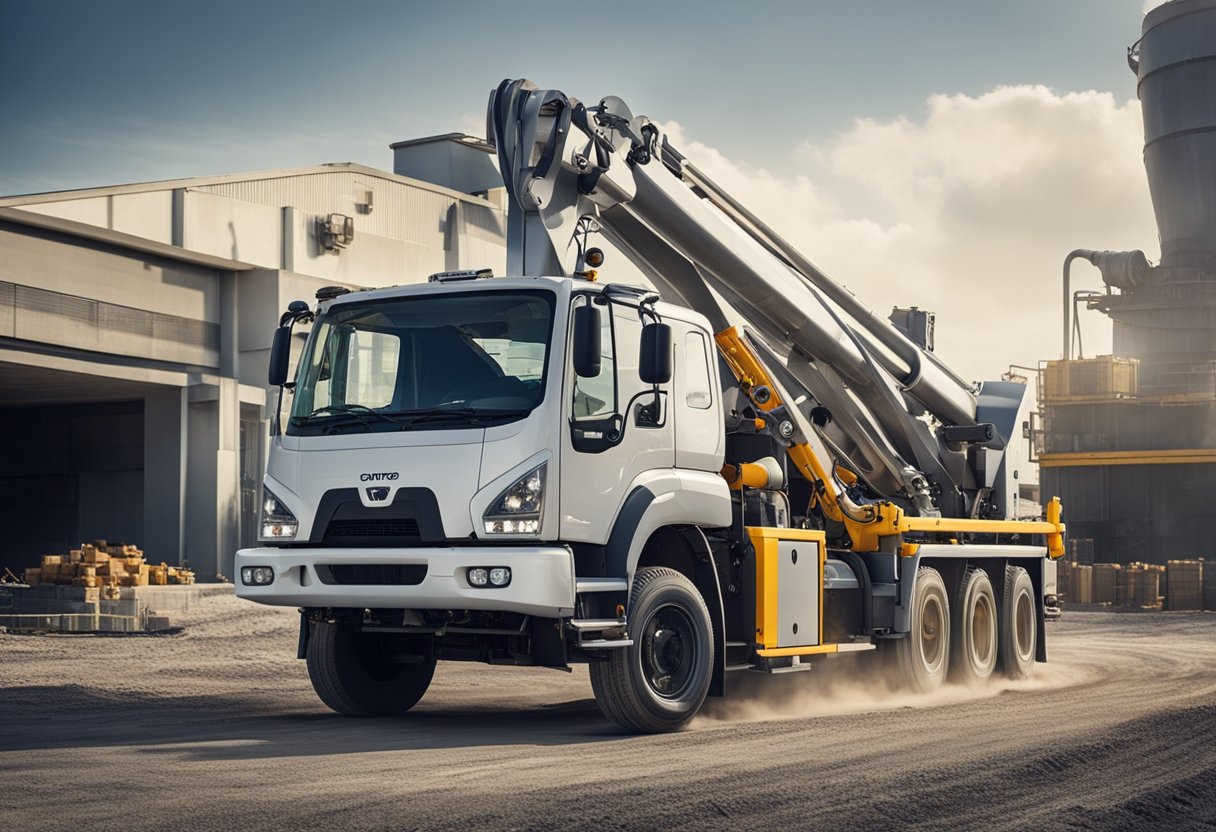
When considering the hourly cost of a concrete pump truck, the labor and operational aspects are significant factors. I’ll dissect these into the nuances of concrete pumping services and the implications of experience and certification costs.
Concrete Pumping Services
Labor costs for concrete pumping services are a critical component, varying by region and complexity of the job. I consider labor to include the time spent by the certified driver and any assisting crew during operation, setup, and cleanup. The effort to prevent waste and spills also figures into labor costs since skilled workers are adept at minimizing excess concrete, which can lead to added expenses.
Experience and Certification Costs
The level of experience and the requisite certifications for a concrete pump operator have a direct impact on hourly costs. A well-trained, seasoned operator can work more efficiently, potentially reducing the time needed on site, contributing to overall cost savings. Here are the keys:
- Certified drivers command higher wages due to their proven capabilities and adherence to safety standards.
- Effort in certification and continuous training represents an investment that, while reflecting on higher upfront costs, can reduce costly mistakes and delays.
In my breakdown, I assess that experience and certification elevate the quality of concrete pumping services, justifying their influence on the cost structure. It’s essential to not undervalue these components when calculating the comprehensive hourly rates of employing a concrete pump truck.
Project-Specific Considerations
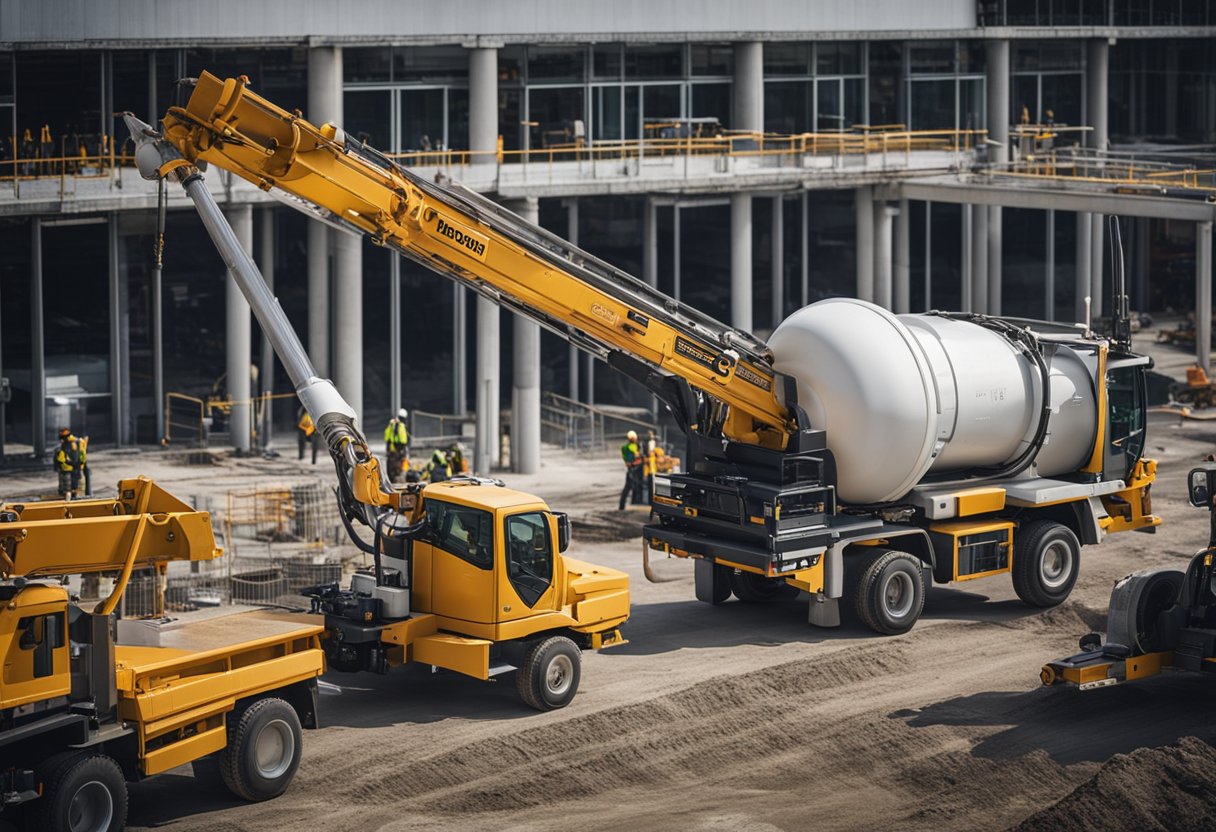
When considering the hourly cost for a concrete pump truck, it’s essential to understand that expenses can vary greatly depending on the details of the project. Two major factors influencing cost are whether the project is residential or commercial and the specific type of project being undertaken.
Residential vs. Commercial Projects
Residential concrete pours, such as those for driveways, patios, or sidewalks, typically require a less complex setup and a smaller truck. These projects often operate at a lower psi requirement and can be completed relatively quickly. The pump truck used for a residential project may have lower rental costs per hour compared to those used for commercial purposes.
In contrast, commercial projects frequently necessitate larger trucks that can handle higher psi and provide a faster pour to accommodate the scale of the project. This includes pours for foundations, large-scale floor slabs, and construction sites that cover much more area than residential projects. Therefore, renting a concrete pump truck for a commercial project will likely incur a higher hourly rate due to these increased capabilities and the greater volume of concrete delivery involved.
Concrete Pumping for Different Project Types
For specific types of projects, my approach carefully considers the unique requirements. A sidewalk or patio might only need a standard concrete pump that operates efficiently in a confined space, allowing you to pour concrete effectively with a smaller crew. The cost here is often more affordable, as the pump can operate at a standard rate, and the overall time required is less.
However, when it comes to more substantial endeavors such as laying the foundation for a new home, building a basement, or constructing large pool decks, the demand on the pump truck increases. Such tasks often require a pump that can deliver high-strength concrete at a faster rate and over a larger area, thus attracting a higher hourly rate. Renting a concrete pump for these extensive applications ensures that concrete is poured efficiently and correctly, maintaining structural integrity.
Remember, for every project, the cost is closely tied to the scale and complexity of the job at hand, which determines the size of the pump needed and the duration it will be in use.
Additional Factors Impacting Cost
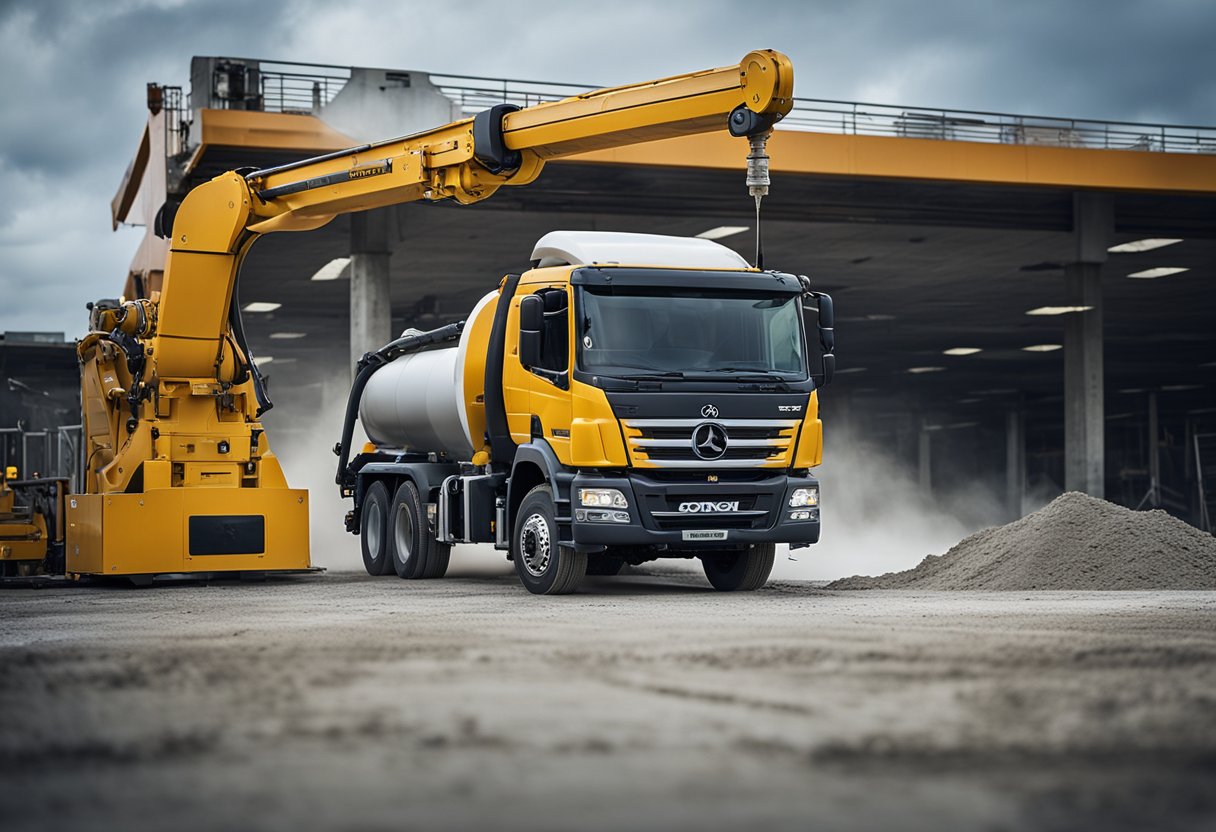
When considering the hourly cost of renting a concrete pump truck, I must not overlook additional factors like materials and the logistics of transportation. These elements can significantly affect the final rental cost.
Materials and Preparation
In my experience, the cost of materials such as rebar, wet cement, gravel, and stone influences the total expenditure. Specifically, ready-mixed concrete varies in price, especially when dealing with a short load where less than the full amount is ordered. Short load delivery often incurs additional fees compared to a full load.
Preparation is also key. The readiness of the site to receive concrete directly affects the pump truck usage time. Delays in preparation could lead to extended rental periods, incrementing the costs.
Transportation and Accessibility
The delivery costs of a concrete pump truck are shaped by transportation logistics. Accessibility to the project site can lead to longer transport concrete times especially if the site is remote or challenging to reach. Fuel costs are also a notable consideration; as the price of fuel fluctuates, so too does the cost of operating the truck.
Moreover, accessibility issues might require special maneuvering or additional equipment, driving up the truck rental hour price. My professional interactions affirm that every minute counts, and any delays in transit are likely to elevate the hourly expense.
Purchasing vs. Hiring Concrete Pump Trucks
https://www.youtube.com/watch?v=HGOOg8YB_H8&embed=true
When considering the acquisition of a concrete pump truck, I weigh the long-term benefits and costs of ownership against the flexibility and lower initial investment of hiring. It’s essential to analyze both avenues to make an informed decision based on specific project needs.
Cost of Ownership
Owning a concrete pump truck involves a significant upfront purchase price. Used concrete pump trucks might offer some cost savings, but maintenance, repair, storage, and operational expenses can add up. It’s also important to account for the depreciation of the vehicle over time. To be more specific, a new concrete pump truck can cost anywhere from $100,000 to $500,000 before GST, and even more for high-capacity models. Moreover, the cost of concrete itself is not included in this price and must be considered in the total cost of ownership.
- Major ownership costs include:
- Initial purchase price
- Regular maintenance
- Unexpected repairs
- Storage fees
- Insurance and possible financing costs
Hire Rates and Considerations
Hiring a concrete pump truck can be more affordable in the short term and offers more flexibility. It eliminates the need for a large initial investment and the ongoing costs associated with ownership. Concrete line pump hire rates generally vary based on the pump’s size and capabilities and the duration of the rental.
For example:
- Daily rental rates might range from $500 to $1,000.
- Operators may be an additional cost.
Renting a concrete pump truck also means I’m not responsible for maintenance or depreciation, making it an attractive option for one-off jobs or infrequent use. However, for long-term projects or frequent concrete pumping needs, hiring can become more expensive over time.
Before deciding to hire, I take into account:
- Hire rates for the required period
- Delivery and pickup fees
- Operator fees, if not included in the base rate
In summary, I consider both the immediate project requirements and long-term business goals when deciding whether to purchase or hire a concrete pump truck. Each option presents its own set of financial considerations that should be carefully evaluated.
Frequently Asked Questions
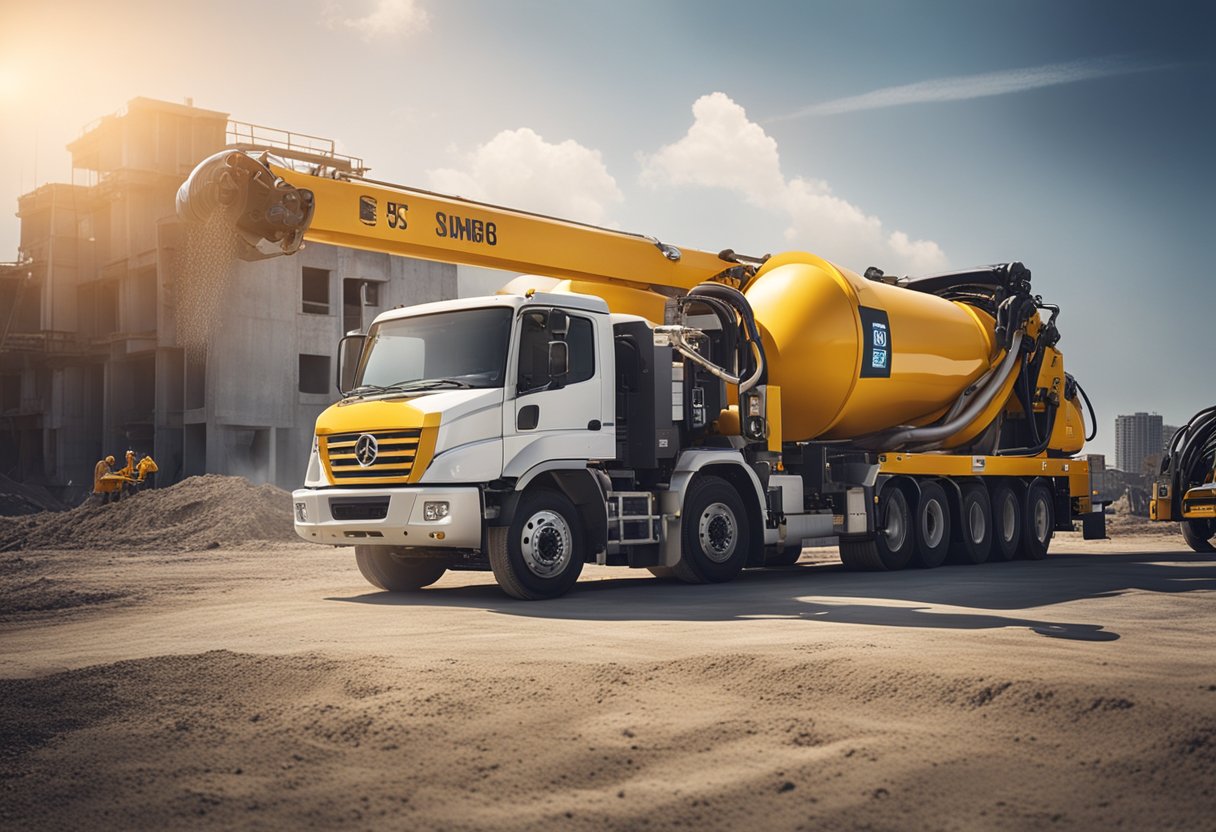
In this section, I’ll address some common inquiries regarding the costs associated with renting a concrete pump truck. We’ll look into factors affecting rental rates, typical cost ranges, variations in costs per yard delivered, and more.
What factors influence the hourly rental rates for a concrete pump truck?
The hourly rental rates for a concrete pump truck are influenced by several factors, such as the size and capacity of the truck, geographical location, duration of the rental, and the complexity of the job. Additional aspects like operator experience and the cost of fuel may also affect the rate.
What is the typical cost range for renting a concrete pump truck per day?
Renting a concrete pump truck for a day usually falls within a cost range of $500 to $1,200, which can vary based on the truck’s model and the rental company’s pricing structure. Some companies may offer discounts for longer rental periods.
How do rental costs for concrete pump trucks vary per yard of concrete delivered?
Rental costs for concrete pump trucks generally change based on the total volume of concrete pumped. Some companies might charge between $2 to $4 per yard delivered, but this price can fluctuate with demand or the specifics of the job.
What is the average capacity of a concrete pump truck in terms of volume pumped per hour?
The average capacity of a concrete pump truck ranges from 10 to 150 cubic yards per hour. This capacity is determined by the pump’s make, model, and condition.
Are there additional charges to consider when renting a concrete pump truck?
There are often additional charges when renting a concrete pump truck, such as travel fees to the job site, setup fees, or environmental fees. It’s always wise to ask the rental company about any potential hidden costs.
How profitable is operating a concrete pump truck as a business venture?
Operating a concrete pump truck can be a profitable venture if managed well. Profitability generally depends on maintaining a steady flow of projects, efficient use of the pump truck, and effective cost management, including maintenance and operational expenses.

